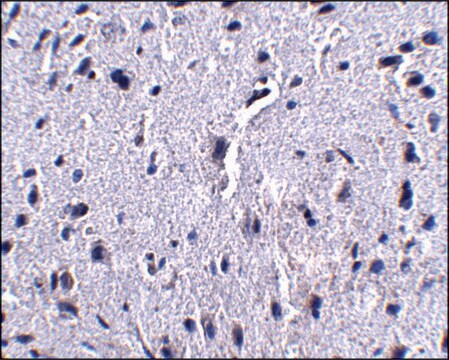D5567
Anti-dimethyl-Histone H3 (diMe-Lys9) antibody produced in rabbit
IgG fraction of antiserum, buffered aqueous solution
Sinónimos:
Anti-H3K9me2
About This Item
Productos recomendados
biological source
rabbit
Quality Level
conjugate
unconjugated
antibody form
IgG fraction of antiserum
antibody product type
primary antibodies
clone
polyclonal
form
buffered aqueous solution
mol wt
antigen 17 kDa
species reactivity
Drosophila, bovine, chicken, Arabidopsis thaliana, Caenorhabditis elegans, human, mouse, frog, rat
technique(s)
ChIP: suitable
microarray: suitable
western blot: 1:1,000-1:2,000 using whole extract of human epitheloid carcinoma HeLa cell line
UniProt accession no.
shipped in
dry ice
storage temp.
−20°C
target post-translational modification
dimethylation (Lys9)
Gene Information
human ... H3F3A(3020) , H3F3B(3021) , HIST1H3A(8350) , HIST1H3B(8358) , HIST1H3C(8352) , HIST1H3D(8351) , HIST1H3E(8353) , HIST1H3F(8968) , HIST1H3G(8355) , HIST1H3H(8357) , HIST1H3I(8354) , HIST1H3J(8356) , HIST2H3A(333932) , HIST2H3C(126961) , HIST3H3(8290)
mouse ... H3c10(319152) , H3c11(319153) , H3f3a(15078) , H3f3b(15081) , Hist1h3a(360198) , Hist1h3b(319150) , Hist1h3c(319148) , Hist1h3d(319149) , Hist1h3e(319151) , Hist1h3f(260423) , Hist1h3g(97908) , Hist2h3b(319154) , Hist2h3c1(15077) , Hist2h3c2(97114)
rat ... H3f3b(117056)
General description
Specificity
Immunogen
Application
Biochem/physiol Actions
Physical form
Disclaimer
¿No encuentra el producto adecuado?
Pruebe nuestro Herramienta de selección de productos.
Storage Class
10 - Combustible liquids
wgk_germany
nwg
flash_point_f
Not applicable
flash_point_c
Not applicable
Certificados de análisis (COA)
Busque Certificados de análisis (COA) introduciendo el número de lote del producto. Los números de lote se encuentran en la etiqueta del producto después de las palabras «Lot» o «Batch»
¿Ya tiene este producto?
Encuentre la documentación para los productos que ha comprado recientemente en la Biblioteca de documentos.
Nuestro equipo de científicos tiene experiencia en todas las áreas de investigación: Ciencias de la vida, Ciencia de los materiales, Síntesis química, Cromatografía, Analítica y muchas otras.
Póngase en contacto con el Servicio técnico








